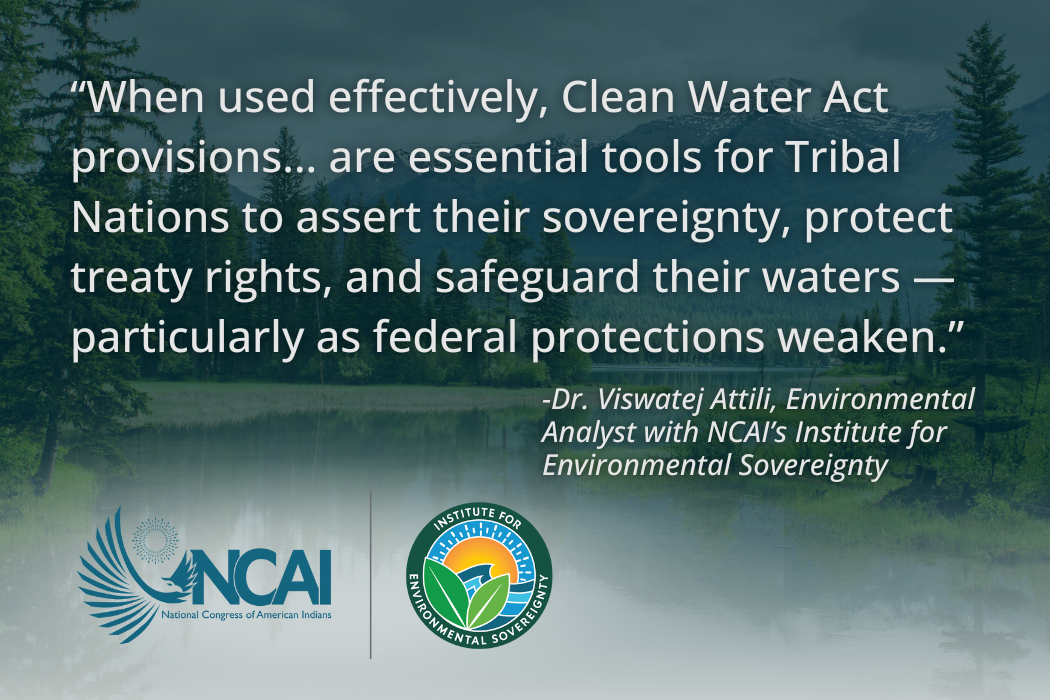
The National Congress of American Indians (NCAI), in partnership with the National Tribal Water Council (NTWC), submitted a formal comment letter this month to the U.S. Environmental Protection Agency (EPA) and the U.S. Army Corps of Engineers (Corps), urging stronger protections for waters and wetlands vital to Tribal Nations — both on and off tribal trust lands following the Sackett v. EPA decision. In response to the Federal Register’s Notice regarding the final response to Supreme Court of the United States (SCOTUS) and the establishment of a public docket, the letter outlines NCAI’s recommendations to ensure Tribal interests are effectively represented in federal rulemaking concerning the definition of Waters of the United States (WOTUS). The letter draws on nine foundational NCAI resolutions — underscoring the organization’s longstanding and consistent defense of Tribal water rights.
“NCAI is taking every opportunity to ensure that Tribal voices are heard and respected in federal rulemaking,” said NCAI President Mark Macarro. “We refuse to allow federal rollbacks to erode our rights or diminish our role as stewards of the land and water.”
Understanding the Context: The Sackett v. EPA Decision
In 2007, Michael and Chantell Sackett, an Idaho couple seeking to build their home, became involved in a legal dispute with the EPA over the federal protection status of wetlands on their property. This seemingly local issue escalated to the Supreme Court, culminating in a landmark 2023 ruling in favor of the Sacketts.
The decision excluded approximately 70 million acres of wetlands — around 84% of areas previously covered under the Clean Water Act. These wetlands are not only ecologically significant but also hold cultural and subsistence importance for Tribal Nations. With fewer waters now under federal protection, Tribal communities face greater risks from pollution, overdevelopment, and habitat loss. The decision also threatens Tribal water sovereignty and the ability to safeguard treaty-reserved rights.
“Tribes across the country must assert their inherent jurisdiction to enact water protection laws for their tribal waterways in response to the erosion of federal protections,” said Ken Norton, Chairman, NTWC.
NCAI’s Response: A Clear Path Forward
In its comment letter, NCAI urges the EPA and Corps to take immediate and concrete steps to protect waters and wetlands vital to Tribal Nations — both on and off tribal trust lands in the wake of Sackett. The letter includes the following core recommendations:
Establish clear, consistent criteria for determining which waters remain protected under federal law.
Ensure Tribal Nations have a meaningful role in identifying and protecting waters critical to their communities.
Develop a robust plan to address the increased risks to Tribal waters caused by the narrowed WOTUS definition.
Respect and uphold Tribal sovereignty, including inherent rights to manage and govern water resources.
Recognize and incorporate Tribal legal authorities and Indigenous Knowledge in water policy and management.
NCAI also calls for the federal agencies to obtain Tribal consent in decisions affecting Tribal waters and to increase support for Tribal water quality programs — needs that have grown even more urgent in light of reduced federal oversight.
“When used effectively, Clean Water Act provisions such as Treatment as a State (TAS) and Section 401 are essential tools for Tribal Nations to assert their sovereignty, protect treaty rights, and safeguard their waters — particularly as federal protections weaken,” said Dr. Viswatej Attili, Environmental Analyst with NCAI’s Institute for Environmental Sovereignty. Dr. Attili, whose work at NCAI includes water quality and critical technologies, headed the organization’s response to the EPA and Corps’ request.
A Continued Commitment to Tribal Sovereignty
NCAI’s comment letter is part of a broader strategy to ensure that Tribal Nations remain at the forefront of decisions affecting their lands and waters. As always, NCAI is leveraging every opportunity to defend Tribal sovereignty and advocate for policy that reflects Indigenous priorities, rights, and values.
The Sackett decision has changed the regulatory landscape — but it has not changed NCAI’s mission. By acting quickly and clearly, NCAI continues to affirm the vital role of Tribal Nations in shaping water governance and protecting the natural resources that sustain their communities.
